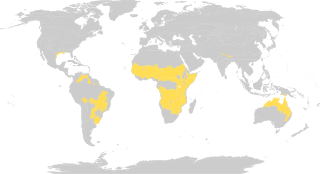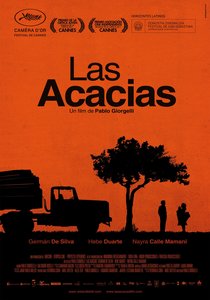
The Fabaceae or Leguminosae, commonly known as the legume, pea, or bean family, are a large and economically important family of flowering plants. It includes trees, shrubs, and perennial or annual herbaceous plants, which are easily recognized by their fruit (legume) and their compound, stipulate leaves. Many legumes have characteristic flowers and fruits. The family is widely distributed, and is the third-largest land plant family in terms of number of species, behind only the Orchidaceae and Asteraceae, with about 751 genera and about 19,000 known species. The five largest of the genera are Astragalus, Acacia, Indigofera, Crotalaria and Mimosa, which constitute about a quarter of all legume species. The ca. 19,000 known legume species amount to about 7% of flowering plant species. Fabaceae is the most common family found in tropical rainforests and in dry forests in the Americas and Africa.

Tropical and subtropical grasslands, savannas, and shrublands is a terrestrial habitat type defined by the World Wide Fund for Nature.. The biome is dominated by grass and/or shrubs located in semi-arid to semi-humid climate regions of subtropical and tropical latitudes.

Gum arabic, also known as acacia gum, arabic gum, gum acacia, acacia, Senegal gum and Indian gum, and by other names, is a natural gum consisting of the hardened sap of various species of the acacia tree. Gum arabic is collected from acacia species, predominantly Acacia senegal and Vachellia (Acacia) seyal. The term "gum arabic" does not indicate a particular botanical source. In a few cases so‐called "gum arabic" may not even have been collected from Acacia species, but may originate from Combretum, Albizia or some other genus. The gum is harvested commercially from wild trees, mostly in Sudan (80%) and throughout the Sahel, from Senegal to Somalia—though it is historically cultivated in Arabia and West Asia.

The Acacia Strain is an American metalcore band from Chicopee, Massachusetts, formed in 2001. The band has gone through several lineup changes and vocalist Vincent Bennett is the only current original member. The Acacia Strain is currently signed to Rise Records.

Acacia (Ακακία) is a social fraternity founded in 1904 at the University of Michigan in Ann Arbor, Michigan. The fraternity has 28 active chapters and 4 colonies throughout Canada and the United States. The fraternity was founded by undergraduate Freemasons, and was originally open only to men who had taken the Masonic obligations, but in 1933 the International Conclave elected to dispense with the Masonic prerequisite. In 1988, at the 45th Conclave, the fraternity elected to use "International" rather than "National" when referring to the fraternity.

Acacia Ridge is a suburb of the City of Brisbane, Queensland, Australia. Acacia Ridge is 15 kilometres (9 mi) south of the central business district. It is within the local government area of City of Brisbane.

Acacia pycnantha, most commonly known as the golden wattle, is a tree of the family Fabaceae native to southeastern Australia. It grows to a height of 8 m (26 ft) and has phyllodes instead of true leaves. Sickle-shaped, these are between 9 and 15 cm long, and 1–3.5 cm wide. The profuse fragrant, golden flowers appear in late winter and spring, followed by long seed pods. Plants are cross-pollinated by several species of honeyeater and thornbill, which visit nectaries on the phyllodes and brush against flowers, transferring pollen between them. An understorey plant in eucalyptus forest, it is found from southern New South Wales and the Australian Capital Territory, through Victoria and into southeastern South Australia.

Vachellia farnesiana, also known as Acacia farnesiana, and previously Mimosa farnesiana, commonly known as sweet acacia, huisache or needle bush, is a species of shrub or small tree in the legume family, Fabaceae. It is deciduous over part of its range, but evergreen in most locales. The species grows to a height of 15–30 feet (4.6–9.1 m) and grows multiple trunks. The base of each leaf is accompanied by a pair of thorns on the branch.

The USCGC Acacia was second to the last of a fleet of 39 similar 180-foot seagoing buoy tenders completed during World War II. Acacia was named after the former United States Lighthouse Service tender Acacia, the only tender sunk during World War II. Acacia is a multi-purpose vessel, nominally a buoy tender, but with equipment and capabilities for ice breaking, search and rescue, fire fighting, logistics, and other tasks as well.

Phyllodes are modified petioles or leaf stems, which are leaf-like in appearance and function. In some plants, these become flattened and widened, while the leaf itself becomes reduced or vanishes altogether. Thus the phyllode comes to serve the purpose of the leaf.

Rosewood refers to any of a number of richly hued timbers, often brownish with darker veining, but found in many different hues.

Acacia melanoxylon, commonly known as the Australian blackwood, is an Acacia species native in South eastern Australia. The species is also known as Blackwood, hickory, mudgerabah, Tasmanian blackwood, or blackwood acacia.

Vachellia nilotica is a tree in the family Fabaceae. It is native to Africa, the Middle East and the Indian subcontinent. It is also a Weed of National Significance and is an invasive species of significant concern in Australia.

Vachellia is a genus of flowering plants in the legume family, Fabaceae, commonly known as thorn trees or acacias. It belongs to the subfamily Mimosoideae. Its species were considered members of genus Acacia until 2009. Vachellia can be distinguished from other acacias by its capitate inflorescences and spinescent stipules. Before discovery of the New World, Europeans in the Mediterranean region were familiar with several species of Vachellia, which they knew as sources of medicine, and had names for them that they inherited from the Greeks and Romans.
Acacia Mining is a gold mining business operating in Tanzania, with exploration properties in Kenya, Burkina Faso and Mali. It is listed on the London Stock Exchange and the Dar es Salaam Stock Exchange and is a constituent of the FTSE 250 Index. Acacia's majority shareholder is Barrick Gold, which owns 63.9% of the company.

Las Acacias is a 2011 Argentine drama film directed by Pablo Giorgelli. The film won the Caméra d'Or at the 2011 Cannes Film Festival.

La malquerida is a Mexican telenovela created for Televisa by Ximena Suárez and produced by José Alberto Castro, based on the 1913 Spanish play titled The Unloved Woman by Jacinto Benavente. The series originally aired on Canal de las Estrellas from June 2, 2014 to November 9, 2014. It stars Victoria Ruffo, Ariadne Díaz, Christian Meier, África Zavala, and Arturo Peniche introduced in the telenovela in the second part of the history.
















